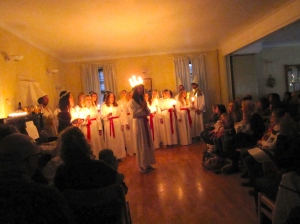Lucia is only celebrated in Sweden and in some parts of Finland. A couple of times I've been to the Lucia celebration at the Swedish Folk High School at Loxdale Centre in Portslade, Brighton. The English people were amazed and asked what it all meant with people dressed in white and candles in their hair. I wasn't quite sure and now, when I've studied a bit of ethnology, I'm even more confused ...
Here are just some of the reasons we celebrate:
Here are just some of the reasons we celebrate:
*Lucia means light. The day got its name from the Italian saint Lucia. She refused to marry and poked out her eyes. As a punishment she was sent to a brothel and was tortured to death.
*In the past people thought that 13 december was the longest night instead of 21 december. People thought it was a magical night when the animals could speak. There are also associations to Lucifer.
*Lucia was a feast before Christmas lent. Some people had as much as seven breakfasts!
*Lucia was a tradition in the West of Sweden where the maids sang for their masters in the morning. Lucia didn't become an official tradition until 1890 when Skansen, a museum in Stockholm made it into a national celebration and in 1920 the first Lucia election was held.
*In the past Lucia marked the end of term at school and the school boys went round people's houses to sing and ask for money for their studies.
*Lucia could have a German origin. Some sources refer to St Nicholaus who gave gifts to children or a similar tradition called Christkindlein where a woman dressed in white with candles in her hair was a part of the Christmas procession.
Soures: God Jul by Lena Kättström Höök and Årets festdagar by Bringéus


No comments:
Post a Comment